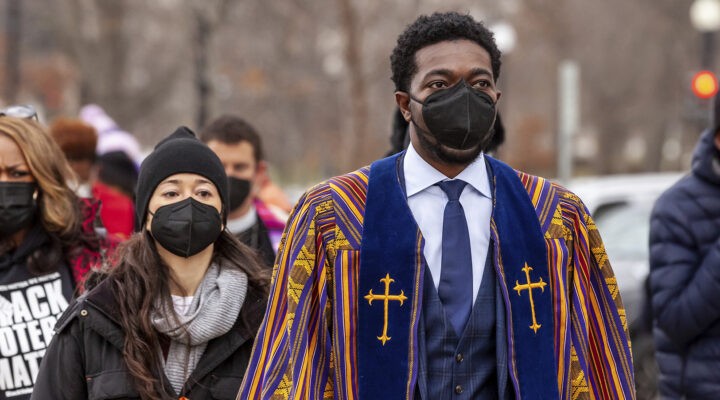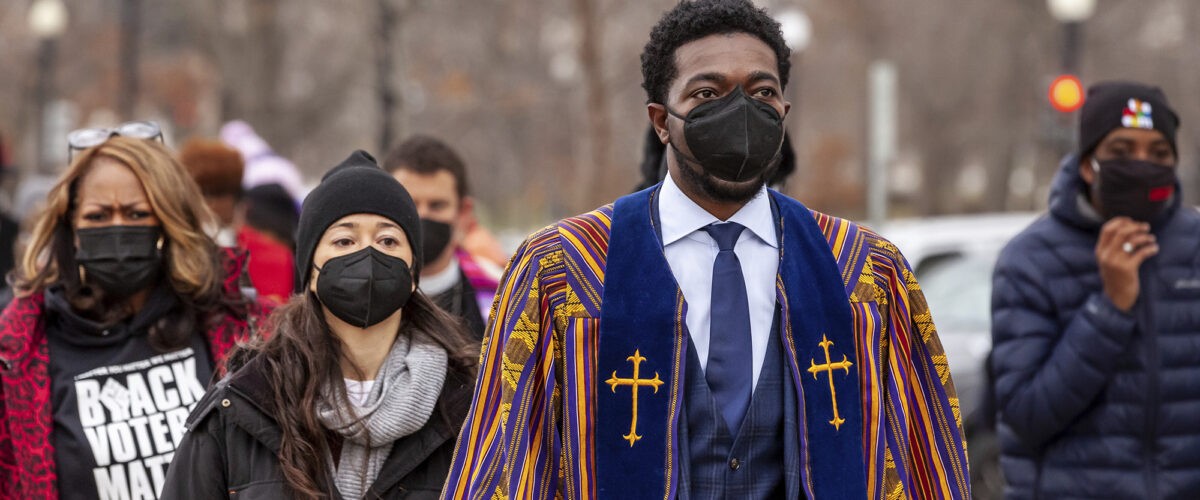The United States Senate’s Jan. 19 refusal to pass voting rights legislation sent to it from the House of Representatives happened despite the appeals of religious leaders nationwide in the week of Martin Luther King celebrations.
The National Council of Churches issued a statement Jan. 17 urging the Senate to pass the voting rights bill, known as the John R. Lewis Act, as a moral imperative.
“American democracy is at an inflection point,” the council said. “Voting rights are again hanging in the balance and … we are compelled to speak out about the urgency of passing critical legislation to ensure the right to vote in our nation.”
The NCC statement pointed to its 1963 Human Rights Policy Statement about the inherent worth, rights and responsibilities of all persons.
“The right to vote is the very center and core of a fair and free democracy. To deny access to the vote is to deny the very humanity and sacredness of those denied.”
That statement recognizes “the right to full participation of the person in political and civic life, including the opportunity to vote by secret ballot.” It further declares that the right to vote “is a basic human right.”
Speaking to the present moment, the NCC statement asserts: “When rights of one are denied, we are all impacted. We must stand together to ensure the full acceptance and citizenship for all in our society, guaranteeing and protecting each person’s human rights on an equal basis. The right to vote is the very center and core of a fair and free democracy. To deny access to the vote is to deny the very humanity and sacredness of those denied.”
NCC officials said the situation is so urgent that “we call for the passage of these bills by any means necessary, including the end of the filibuster that has historically been used to block the voting rights of African Americans.”
“This is a moment for us to act,” the statement concluded. “This is a moment when we must stand up and speak out as people of faith and conscience, calling on the Senate to end the filibuster and pass these critical pieces of voting rights legislation and ensure the right to vote.”
John C. Dorhauer, past chair of the NCC Governing Board and general minister and president of the United Church of Christ National Ministries, gave this additional interpretation: “I consider passage of the voting rights bill to be the single most important matter before Congress right now. The very foundations of our democracy are being dismantled as red state legislators rewrite voting laws, giving new powers to state officials to overturn legitimate election outcomes and restricting voter access. The Senate must, by any means necessary, finish the work of the House and establish federal protections for voting rights or be remembered throughout history as those whose failure to lead ended democracy as we knew it.”
“I consider passage of the voting rights bill to be the single most important matter before Congress right now.”
Likewise, Gina M. Stewart, president of Lott Carey, an international missions organization, issued a sharp statement Jan. 17, the day observed as a federal holiday in honor of Martin Luther King Jr.
“What we are witnessing today is not the democracy Dr. King marched, went to jail, and fought for,” she said. “Over the past year, we’ve seen countless laws and bills drawn up by state legislators that restrict access to the ballot box for millions of Americans. These enacted and proposed laws include vote-by-mail restrictions, restrictions on early voting, and broader authority for purges of voter rolls. An often-cited reason for these bills and laws is voter fraud, yet voter fraud is extremely rare. Unfortunately, these laws disproportionately undermine the ability of people of color to vote.”
She added: “The right to vote is not a partisan issue; it is the basis of our entire democracy. The 15th Amendment to the Constitution guarantees our right to vote regardless of race or creed. Until we have equal access to the ballot, we cannot make progress on any other issue. Making progress on climate change policy, canceling student debt, protecting the rights of women, criminal justice reform, etc., all start with ensuring that every American can have their ballot cast safely, conveniently and equally.”
After the Senate failed to pass the bill, Fellowship Southwest issued a brief statement expressing its dismay. Fellowship Southwest is a missions and advocacy group uniting Baptists and others across the Southwestern states from California to Texas.
“Fellowship Southwest is deeply disappointed in the recent failure of federal voting rights legislation in the U.S. Senate.”
“Fellowship Southwest is deeply disappointed in the recent failure of federal voting rights legislation in the U.S. Senate,” the statement said. “The freedom to vote and ensure all votes count is fundamental to our democracy. Moreover, we have a long and sad history of denying citizens the equal right to vote due to racial discrimination. The struggle continues to this day, and federal legislation is needed to protect the right to vote.”
Willie D. Francois III, social justice coordinator for the Progressive National Baptist Convention, said Jan. 18 that fighting for voting rights is an effort to conquer evil. He spoke at a news conference in Atlanta that was livestreamed by the denomination.
“This convention practices a ministry of erosion,” he said. “What does that mean? We keep showing up so that we wear evil down. The denial of voting rights is evil. The protection of Senate rules over the protection of the public is evil.”
Related articles:
Voting rights and the people who died for them: Jonathan Daniels et al. | Opinion by Bill Leonard
Voting rights and the ninth commandment | Analysis by Stephen Reeves
Poor People’s Campaign marches on Texas Capitol with demands for voting rights


